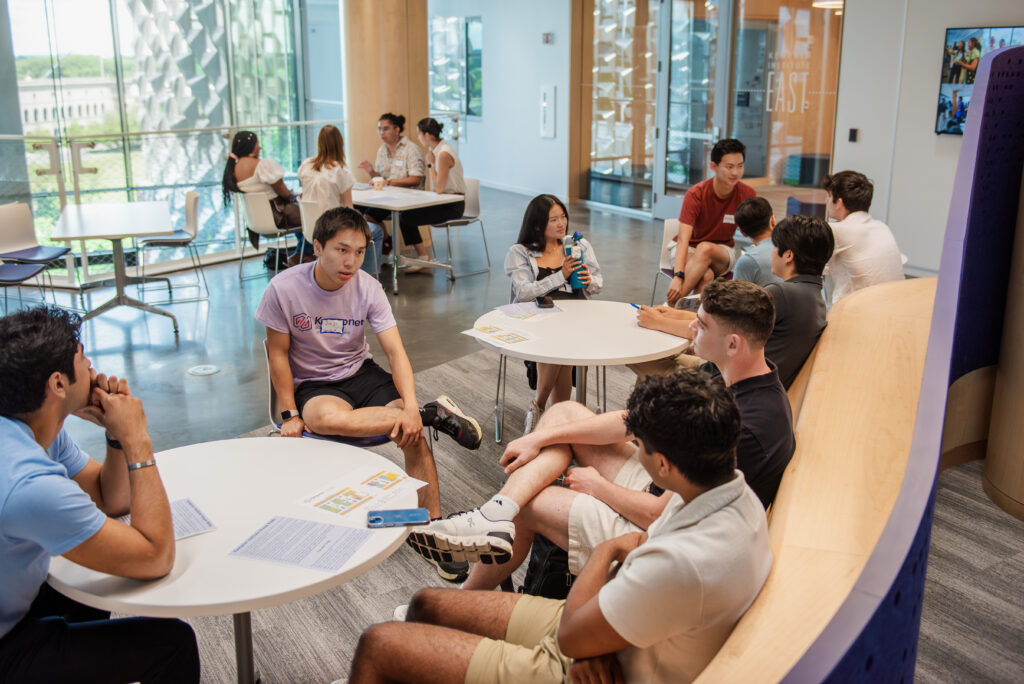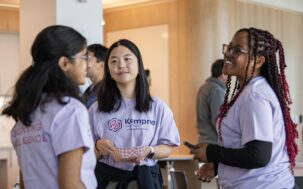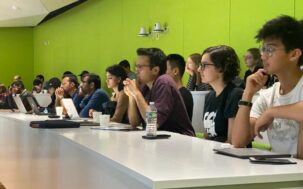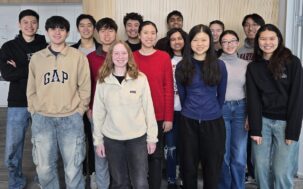Kempner Kicks Off Summer Undergraduate Research Program
Eleven Harvard undergraduates welcomed as inaugural KRANIUM participants

This year's cohort of KRANIUM students is comprised of 11 Harvard undergraduates, each undertaking an individual research project investigating the foundations of intelligence in natural and artificial systems.
Cambridge, MA—On June 10 the Kempner Institute welcomed its first cohort of undergraduate summer students for the start of KRANIUM, a 9-week intensive summer research program in intelligence for Harvard undergraduates.

This summer’s participants include 11 Harvard students at various stages of their undergraduate studies–from first year students to seniors. Each student is supervised by a Kempner-affiliated faculty member and undertakes an individual research project investigating the foundations of intelligence in natural and artificial systems. This summer’s student projects cover a diverse range of intelligence topics, from using machine learning to predict antibiotic resistance, to employing large language models to better understand how linguistic attributes correlate with neural signals in electrocorticogram recordings of the brain.
Sponsored by the Kempner Institute as part of the Harvard Summer Undergraduate Research Village (HSURV), KRANIUM (Kempner Research in Artificial & Natural Intelligence for Undergraduates with Mentorship) provides funding, room & board, mentorship, and a host of educational and community programming for participating students.
In addition to the KRANIUM summer program, the Kempner also offers undergraduate research opportunities during the fall and spring semesters through the KURE program. To learn more, visit the undergraduate research programs page on our website.
The full list of Summer 2024 KRANIUM participants, mentors and projects are listed below:
| KRANIUM Student | Faculty Supervisor | Primary Mentor(s) | Project |
| Ege Çakar | Cengiz Pehlevan | Cengiz Pehlevan | Logic Gate Learning: From Building Blocks to Complex Logical Tasks in Neural Networks |
| Emma Finn | Demba Ba | Manos Theodosis and Andy Keller | Learning Artistic Signatures: Symmetry Discovery for Style Transfer |
| Ely Hahami | Haim Sompolinsky | Kazuki Irie | Large Language Models with Long-Term Memory |
| Kayla Huang | Sham Kakade | David Brandfonbrener | Enhancing natural language capabilities of AI through hybrid MoE and GSSM models |
| Lavik Jain | Marinka Zitnik | Yasha Ektefae | Predicting Antibiotic Resistance in Mycobacterium tuberculosis with Interpretable Machine Learning |
| Justin Ji | Martin Wattenberg | Kenneth Li | AttackVis: A visualization playground for large language models in response to adversarial attacks |
| Sean Meng | Bernardo Sabatini | Kevin Mastro | Informing ML “Explore/Exploit” Balance through Insights from Age-Dependent PFC Circuit Modulation |
| Aneesh Muppidi | Samuel Gershman | Wilka Carvalho | Let’s Learn Agency: Emergent Agent-Oriented Representations |
| Anne Mykland | David Alvarez-Melis | Naomi Saphra | Polysemy and Large Language Models |
| Alliyah Steele | Gabriel Kreiman | Morgan Talbot and Prinav Misra | Utilizing Large Language Models to Correlate Linguistic Attributes with Local Field Potential Responses in Ecog Recordings. |
| Johnathan Sun | Sham Kakade | Samy Jelassi | Search Algorithms and Value Functions in Programming Puzzles |
About the Kempner
The Kempner Institute seeks to understand the basis of intelligence in natural and artificial systems by recruiting and training future generations of researchers to study intelligence from biological, cognitive, engineering, and computational perspectives. Its bold premise is that the fields of natural and artificial intelligence are intimately interconnected; the next generation of artificial intelligence (AI) will require the same principles that our brains use for fast, flexible natural reasoning, and understanding how our brains compute and reason can be elucidated by theories developed for AI. Join the Kempner mailing list to learn more, and to receive updates and news.






